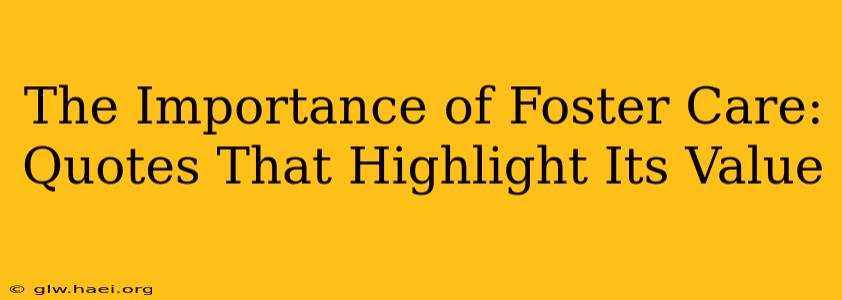Foster care. The very phrase evokes a tapestry of emotions – compassion, resilience, heartbreak, and ultimately, hope. It’s a system that often operates in the shadows, yet its impact on countless lives is undeniable. This isn't just about providing a temporary home; it's about shaping futures, mending broken hearts, and offering a lifeline to children in need. Let's explore the profound significance of foster care through powerful quotes and a deeper dive into its essential role in our society.
Why is Foster Care Important?
The importance of foster care stems from its crucial role in protecting vulnerable children and providing them with the stability and support they need to thrive. When a child's biological family is unable to provide a safe and nurturing environment, foster care steps in as a vital safety net. It’s not about replacing a family, but offering a temporary, loving home while solutions for the child's long-term well-being are explored. The impact extends far beyond the immediate needs of the child; it contributes to the health of our communities as a whole.
What are the Benefits of Foster Care?
Foster care offers a multitude of benefits, all contributing to a child's overall well-being and future success. These benefits aren't just material; they extend to the emotional, psychological, and social development of the child.
Providing a Safe and Stable Environment:
This is arguably the most crucial benefit. Foster care removes children from harmful situations, offering a respite from abuse, neglect, or instability. This stability is essential for healthy development.
Meeting Basic Needs:
Foster care ensures children have access to essential resources like food, clothing, shelter, and healthcare—often necessities that were lacking in their previous living situations.
Emotional Support and Nurturing:
Beyond the basic necessities, foster parents provide emotional support, love, and guidance. This nurturing environment helps children heal from past traumas and develop healthy coping mechanisms.
Educational Support and Opportunities:
Many foster care programs actively support the child's education, providing tutoring, mentoring, and access to educational resources that may have been unavailable before.
Quotes That Capture the Essence of Foster Care
Several quotes encapsulate the profound impact and emotional weight of foster care:
-
"The best thing about being a foster parent is the love you receive in return." This simple quote speaks volumes about the reciprocal nature of the relationship – the immense love and gratitude shared between foster parent and child.
-
"Sometimes the smallest things take up the most room in your heart." This aptly describes the enduring bond that forms between foster parents and the children in their care, even if it's for a limited time.
-
"Foster care is not about fixing broken children; it's about helping them find their strength." This emphasizes the empowering role of foster care – enabling children to overcome adversity and discover their resilience.
-
"To the world, you may be one person, but to one person, you may be the world." This powerful quote highlights the immense impact a single foster parent can have on a child’s life.
Frequently Asked Questions (PAAs) about Foster Care
What are the challenges of foster care?
Foster care is not without its challenges. Children often arrive with complex emotional needs, trauma, and behavioral issues that require specialized care. Foster parents often face emotional strain, financial burdens, and logistical complexities in navigating the system. The system itself can be bureaucratic and challenging to navigate, creating additional stress for families.
How can I become a foster parent?
The process of becoming a foster parent varies depending on location. It typically involves undergoing a thorough background check, completing training courses, and meeting specific requirements set by the relevant child protective services agency. Research your local agency to find out the specific steps involved in your area.
What is the difference between foster care and adoption?
Foster care is a temporary arrangement, aimed at providing a safe and nurturing environment until a child can return to their biological family or be adopted. Adoption, on the other hand, is a permanent legal arrangement where the child becomes a legal member of their foster family.
How long do children typically stay in foster care?
The length of time a child remains in foster care can vary greatly depending on individual circumstances. Some children may only need temporary care, while others may remain in the system for years. The goal is always to find the most appropriate and permanent solution for the child's well-being.
What support is available for foster families?
Many resources are available to support foster families, including financial assistance, respite care, counseling services, and support groups. The exact types of support available will vary depending on the location and the agency overseeing the foster care placement.
In conclusion, the importance of foster care cannot be overstated. It's a vital safety net for vulnerable children, providing them with a chance at a brighter future. While it presents challenges, the rewards of providing love, stability, and hope to a child in need are immeasurable. Understanding the value of foster care and the support systems available helps ensure that this critical service continues to flourish and offer a lifeline to those who need it most.

